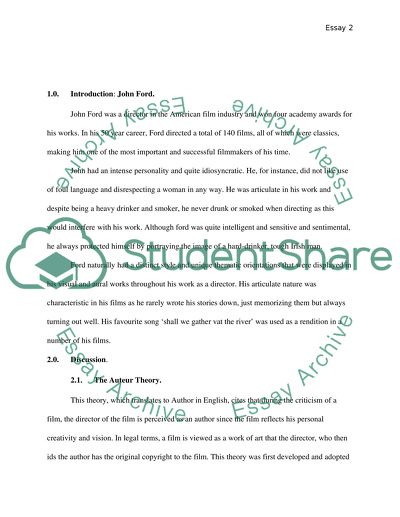Cite this document
(“John Ford: The Auteur Theory Essay Example | Topics and Well Written Essays - 1500 words”, n.d.)
John Ford: The Auteur Theory Essay Example | Topics and Well Written Essays - 1500 words. Retrieved from https://studentshare.org/visual-arts-film-studies/1450764-choosing-one-of-the-following-john-ford-mathieu
John Ford: The Auteur Theory Essay Example | Topics and Well Written Essays - 1500 words. Retrieved from https://studentshare.org/visual-arts-film-studies/1450764-choosing-one-of-the-following-john-ford-mathieu
(John Ford: The Auteur Theory Essay Example | Topics and Well Written Essays - 1500 Words)
John Ford: The Auteur Theory Essay Example | Topics and Well Written Essays - 1500 Words. https://studentshare.org/visual-arts-film-studies/1450764-choosing-one-of-the-following-john-ford-mathieu.
John Ford: The Auteur Theory Essay Example | Topics and Well Written Essays - 1500 Words. https://studentshare.org/visual-arts-film-studies/1450764-choosing-one-of-the-following-john-ford-mathieu.
“John Ford: The Auteur Theory Essay Example | Topics and Well Written Essays - 1500 Words”, n.d. https://studentshare.org/visual-arts-film-studies/1450764-choosing-one-of-the-following-john-ford-mathieu.


